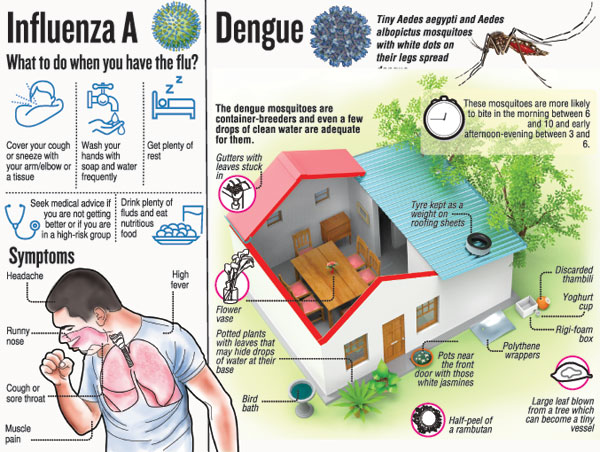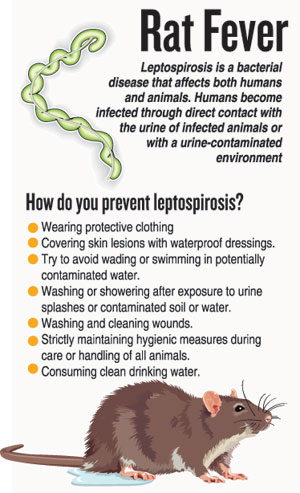The rains are here, so are the trio of bugs
The rains have come in all their ferocity and there is a trio of bugs that are doing the rounds.
They are the viruses causing influenza and dengue and the bacterium which gives humans rat fever.
Don’t be fearful, but take some basic precautions to keep these viruses and bacteria away from your home and family, is the message from several doctors that MediScene spoke to.
 If in case you do pick up a bug, seek medical advice immediately – is the loud and clear call.
If in case you do pick up a bug, seek medical advice immediately – is the loud and clear call.
Influenza or flu
Currently the virus causing the flu is predominantly Influenza A, spread when an infected person sneezes or coughs sending out droplets full of the virus, contaminating the environment around him/her.
The symptoms of influenza are:
- Fever
- Runny nose
- Cough
- Sore throat
- Aches and pains of the body
While the flu is self-limiting and should pass off in four-to-five days, it would be advisable to seek advice from a qualified medical doctor, especially as there are certain high-risk groups who need to take extra care, says Consultant Epidemiologist Dr. Samitha Ginige.
In these high-risk groups in whom the flu can progress to a serious condition are pregnant and lactating mothers; children less than 2 years of age; adults more than 65 years of age; those who have chronic illnesses such as uncontrolled Diabetes Mellitus and chronic respiratory illnesses (asthma); those who are on long-term steroid treatment; and those who are immune-deficient.
If the following dangerous symptoms which indicate serious illness occur, he urges people to go to the nearest hospital immediately. These symptoms are:
- Difficulty in breathing
- Chest or abdominal pain and/ or heaviness
- Persistent vomiting
- Dizziness
 Parents need to be alert to the following red-flags in small children and take them to hospital immediately:
Parents need to be alert to the following red-flags in small children and take them to hospital immediately:
- Poor sucking
- Difficulty in swallowing liquids
- Reduced urine output
- Irritable behaviour
The answers to recovering quickly from the flu are:
- Resting well
- Eating nourishing food
- Drinking warm liquids
- Mothers should continue to breastfeed infants and young children even if these children are ill
Meanwhile, a few simple measures will help prevent the spread of influenza:
- Covering the nose and mouth with a handkerchief or tissue when coughing or sneezing
- When a handkerchief or tissue is unavailable, bending the arm and using the inner side of the elbow to cover the nose and mouth
- Disposing of the tissues used during coughing and sneezing to a bin immediately
- Washing and drying the used handkerchiefs thoroughly and frequently
- Avoiding touching the face, particularly the mouth, nose and eyes unnecessarily
- Washing the hands thoroughly with soap and clean water after returning home from work/shopping/public travel
- Avoiding public places as much as possible
- Patients with influenza should not go to work
- Children with influenza should not be sent to pre-school, school, tuition classes or for extra-curricular activities
- Dengue
Try as much as possible to avoid getting bitten by dengue-infected mosquitoes, is the advice of doctors.
The four strains (serotypes) of the dengue virus – DENV1, DENV2, DENV3 and DENV4 – are spread by the bite of the tiny Aedes aegypti and Aedes albopictus mosquitoes which can be identified by the white dots on their legs.
Profiling the disease, Consultant Paediatrician Dr. LakKumar Fernando said that the infection with one strain provides life-long immunity only to that strain. Even though there could be some cross-immunity against the other three serotypes for a shorter period, between three months to one year, a second infection after that can be quite virulent.
“If a person gets another strain, the antibodies created in the body by the first infection will make the second episode of illness more severe,” he says pointing out that any of the four virus strains can cause either Dengue Fever (DF) or Dengue Haemorrhagic Fever (DHF). While DF abates without causing much trouble, danger arises from DHF and if the patient is not managed medically, he/she can quickly descend into severe haemorrhaging (bleeding) and also shock during the critical phase of fluid leakage and die.

Dr. Samitha Ginige
The symptoms are:
- Sudden high fever
- Severe headache
- Pain behind the eyes
- Severe joint and muscle pain
- Fatigue
- Nausea and vomiting
- Skin rash which may appear after the onset of fever
The dengue mosquito is mostly active from about 6-10 a.m. and in the early afternoon-evening about 3-6 p.m. during the day and as such men, women and children should wear long-sleeved clothing which also covers the whole body and use a mosquito-repellent.
If a person has fever above 100 Fo (37.7 Co), the dengue NS1 Rapid Antigen Test done within 12-24 hours of the onset of fever will indicate whether he/she is positive for dengue, reiterates Dr. Fernando. Usually, a person’s body temperature is 98.6 Fo (37 Co).

Dr. LakKumar Fernando
In a full-blood count (FBC) test, meanwhile, what needs to be checked is whether there is a ‘sudden’ drop in the platelet count, even if it is over the right limit. This sudden drop is a very strong danger signal and needs to be heeded and treatment sought at a hospital,he says, pointing out that in these people, rather than those whose platelet count is dropping slowly, the outcome could be worse.
A categorical “no, no” comes with regard to the use of common pain-relieving medications, when dengue is doing the rounds in the country. “Even if it is not dengue, it is better to be safe than sorry and avoid non-steroidal anti-inflammatory drugs (NSAIDs) such as aspirin, ibuprofen, mefenamic acid and diclofenac sodium. These NSAIDs not only worsen the complications of DHF, but can also result in the death of the patient, stresses Dr. Fernando.
Even if NSAIDs are prescribed on Day 1 or 2 of fever, it will have an impact on dengue and complicate the management of dengue patients, he says, adding that NSAIDs are administered orally as tablets or syrup or inserted as suppositories. On the other hand, the ideal treatment for fever is paracetamol taken at the right dose and at the right time and sponging, MediScene learns.
According to Dr. Fernando if a fever is due to the dengue virus, NSAIDs have a systemic impact and also a local impact.
- The systemic effect — impaired platelet aggregation (clumping together to cause clotting); an impact on the coagulatory system; and liver damage.
- The local effect — tiny gastric erosions and if the NSAID has been in suppository form in the rectum, mucosal damage in this region.
- Describing in detail what can happen, he says that in DHF, when fluid leakage starts and the blood pressure drops, the patient’s body attempts a compensatory distribution of blood to the peripheries and vital organs, constricting blood supply at gut level. This results in the gastrointestinal (GI) tract getting affected before the peripheral supply is compromised and the mild gastric erosion caused by the NSAIDs becoming bigger. This causes bleeding in the GI tract, curbing of which is not easy.

Prof. Suneth Agampodi
“Usually deaths occur among DHF patients due to prolonged shock, fluid overload or massive bleeding,” he said.
It is easy to prevent mosquito proliferation as dengue mosquitoes are ‘container-breeders’, urge doctors. This means that they can lay eggs in anything even with a few drops of clean water. (see graphic)
The important thing to remember is that all collections of water, be it small or big, need to be cleared out and the water-holders scrubbed thoroughly every two days. “Go around your house, workplace, school, tuition class, construction site and garden looking for water-collection points and clear them out,” urges Dr. Fernando.
Rat fever (mee una) or leptospirosis
The bacteria (leptospires) causing this infectious disease is found in the kidneys of animals (natural hosts) such as rodents, livestock (cattle and buffalo), canines and also wild mammals. When these animals pass urine, the bacteria get excreted and contaminate water, soil and food.
It is Professor of Community Medicine of the Rajarata Medical Faculty, Prof. Suneth Agampodi who gives a clear picture of how humans get infected. “It is when humans get exposed to this urine-contaminated water, soil or food that they become ‘incidental’ or ‘accidental’ hosts and acquire rat fever,” he says, explaining that the bacteria may enter through wounds or lesions in the skin or nasal, oral or eye mucous membranes.
Even tiny lesions on the skin unseen by the naked eye can allow the bacteria to get into a human, says Prof. Agampodi who has done much research into this disease and is an Executive Committee member of the International Leptospirosis Society.
A person who drinks contaminated water is also vulnerable, as the bugs can get into the blood through the mucosal membrane of the digestive system and invade tissues and organs, MediScene learns.
Once exposed, the symptoms will manifest themselves within 5-14 days. Although re-infection from the same sub-strain does not occur once cured of that infection, a different sub-strain, however, can affect the same person.
The symptoms of leptospirosis are:
- Mild flu-like illness to serious and sometimes fatal disease
- Fever
- Chills
- Conjunctival suffusion (reddening of the eyes)
- Frontal headache
- Muscle tenderness (particularly calf and lumbar areas)
- Jaundice (yellowing of the skin and eyes).
Rat fever can mimic other diseases such as dengue, influenza, meningitis and hepatitis, MediScene learns, with the deciding factor being whether the person had been working outdoors where there is stagnant water or wet soil even in highly residential areas.
Urging that these symptoms should not be ignored but medical help sought immediately, Prof. Agampodi reiterates that “serious” could be the repercussions if rat fever is neglected. These will be renal failure, heart failure, pulmonary haemorrhage and haemorrhage, leading to death.
With the familiar, ‘Prevention is always better’, applying to rat fever too, these are the measures that can keep this disease at bay:
- Thoroughly clear out garbage and keep areas where people live free of rodents
- Don’t keep piles of straw lying around and get rid of rats in the fields
- Clean up stagnant pools of water
- Try to curb animals from entering gardens, playgrounds and places where children play
- If there is a need to work in the fields, try to use protective clothing and keep cuts, bruises and wounds covered with waterproof dressings.
- Drink boiled water as virulent organisms can withstand chlorination and filtering.
- Don’t wade through flood waters.
While many who get rat fever have been engaged in agriculture, those working in marshy areas, garbage collectors, those cleaning canals and drains, fresh-water fishermen, brick manufacturers, gem miners and also sand miners should also be careful and even home-gardeners should take precautions.


